

Play in education: the role and importance of creative learning. Here we've collated some highlights and links from our recent live chat exploring the benefits and challenges associated with learning through play.
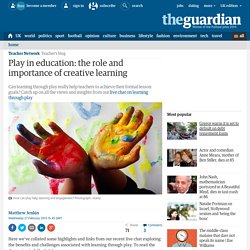
To read the discussion in full, click here. Don Ledingham, education blogger and director of education and children's services for Midlothian Council Over the years I've become a complete convert to the early years' approach, where children are encouraged to learn through play and active learning. It's been interesting to watch this approach percolate through the primary school, where play is now often used productively with older children. Yet when I consider the secondary school curriculum, the notion of using play as an approach to promoting learning is rare and, in some subject areas, completely unknown. But play has been used productively in secondary schools. To read more of Don's views and ideas, visit his blog here. Teresa Cremin, professor of education at the Open University The world is changing and is more uncertain than ever before. Power of Play: Applied Knowledge, Engaged Learning Greg Young "Daddy, why is this squirrel not moving?
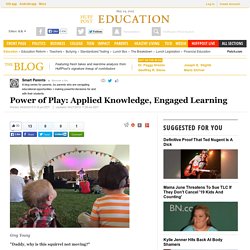
" Henry is sitting there, squatted over a very dead squirrel. It was at this moment that I realized I was totally unprepared to introduce the concept of death to a 2 year old. Do I say the squirrel has gone to heaven? Or, try to explain what happened? After sitting there for another few seconds Henry says, "So he's like Nana? " My wife and I have both taught for a number of years in progressive public schools. Nurturing the spark. Let the Kids Learn Through Play. Photo TWENTY years ago, kids in preschool, kindergarten and even first and second grade spent much of their time playing: building with blocks, drawing or creating imaginary worlds, in their own heads or with classmates.
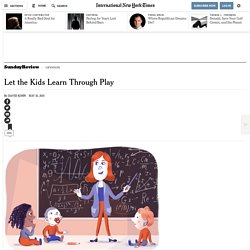
But increasingly, these activities are being abandoned for the teacher-led, didactic instruction typically used in higher grades. In many schools, formal education now starts at age 4 or 5. Without this early start, the thinking goes, kids risk falling behind in crucial subjects such as reading and math, and may never catch up. The idea seems obvious: Starting sooner means learning more; the early bird catches the worm. But a growing group of scientists, education researchers and educators say there is little evidence that this approach improves long-term achievement; in fact, it may have the opposite effect, potentially slowing emotional and cognitive development, causing unnecessary stress and perhaps even souring kids’ desire to learn. Continue reading the main story. Games to Ignite Brains.
How about this for an idea?
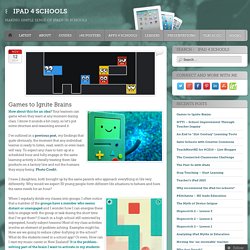
Your learners can game when they want at any moment during class. I know it sounds a bit crazy, so let’s put some structure and reasoning around it. I’ve outlined in a previous post, my findings that quite obviously, the moment that any individual learner is ready to listen, read, watch or even learn will vary. To expect any class to turn up at a scheduled hour and fully engage in the same learning activity is literally treating them like products on a factory line and not the humans they enjoy being. Photo Credit. I have 2 daughters, both brought up by the same parents who approach everything in life very differently.
When I regularly divide my classes into groups, I often notice that a number of the groups have a member who seems distant or unengaged and I wonder how I can energise these kids to engage with the group or task during the short time that I’ve got them? The other day, I noticed one of my daughters playing a puzzle type game on my iPad. Related. Q&A: John Seely Brown on Interest-Driven Learning, Mentors and the Importance of Play. 3.1.12 | As the leading thinkers and do-ers meet this week at the third annual Digital Media and Learning conference, Spotlight talked with DML2012’s keynote presenter John Seely Brown, self-proclaimed “chief of confusion,” and one of the most enlightening thinkers on nearly any topic.
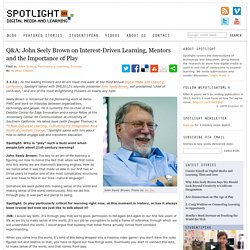
John Seely Brown. Photo by Joi Ito. Seely Brown is renowned for his pioneering work at Xerox PARC and work on interplay between organizations, technology and people. He is currently the co-chair of the Deloitte Center for Edge Innovation and a senior fellow at the Annenberg Center for Communication at University of Southern California. His latest book (with Douglas Thomas) is “A New Culture of Learning: Cultivating the Imagination for a World of Constant Change.” Spotlight: Why is “play” such a buzz word when people talk about 21st-century learning? Somehow we were pulled into making sense of the world and making sense of the world continuously. JSB: I would say both. JSB: Yes. JSB: Absolutely. Playing to Learn. A review of A New Culture of Learning: Cultivating the Imagination for a World of Constant Change by Douglas Thomas and John Seely Brown, 2011.

ISBN-13: 978-1456458881 Play is neither trivial nor frivolous; it is how we learn. Douglas Thomas and John Seely Brown take seriously the role of play as a mindset that needs to be cultivated in education.